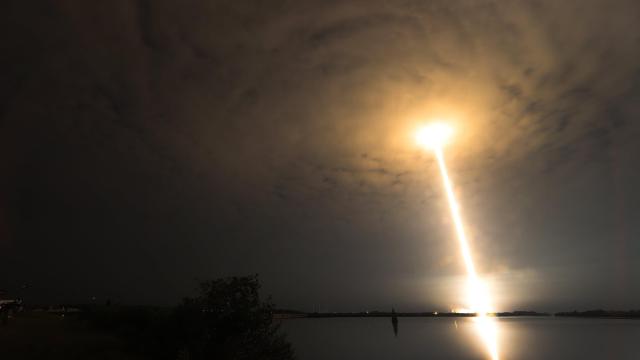Elon Musk’s Starlink satellite internet company is on a collision course with 5G. That’s what SpaceX wants you to think, anyway.
In a spicy new analysis released this week, SpaceX, which owns and operates the Starlink satellite network, argues that television provider Dish’s attempts to open up the 12GHz spectrum for both satellite use and Dish’s 5G mobile network would lead to interference that would, in effect, render Starlink’s product “unusable.” SpaceX’s Starlink satellites currently rely on the coveted 12GHz band to provide downlink services in the U.S.
In its analysis, SpaceX claims some amount of “harmful interference from terrestrial mobile service” (i.e. Dish’s 5G network) within the 12.2-12.7GBHz spectrum band would occur about 77% of the time. The company claims that interference could result in full Starlink outages 74% of the time. From SpaceX’s perspective, Dish’s lobbying efforts potentially pose an existential risk to Starlink’s business in certain markets. Dish, on the other hand, has previously said opening up 12GHz to 5G represents a “win-win” for all involved.
“We want co-existence,” Dish EVP of External & Legislative Affairs Jeff Blum told Fierce Wireless last year. “We believe co-existence is possible. We want to protect our own satellite service.”
For those who’ve lost track, SpaceX has launched around 2,700 Starlink satellites into Earth’s low-earth-orbit and has over 400,000 subscribers worldwide, first launching its internet service in October 2020. SpaceX CEO Elon Musk has said he hopes to boost the number of satellites in space up to 42,000 over the new few decades, with the ultimate goal of helping bring online roughly one-third of the world population that still lacks internet access. For now, though, SpaceX is mostly bringing frustratingly unreliable internet to rural Americans. Musk’s company says that Dish’s efforts to incorporate 5G in the 12GHz band could muck those plans up.
Dish said that the company’s “expert engineers” are currently evaluating SpaceX’s claims. The Federal Communications Commission, which governs wireless spectrum use, did not immediately respond to Gizmodo’s request for comment. SpaceX did not immediately respond to Gizmodo’s request for comment.
The company’s impassioned analyses comes in response to a separate earlier report conducted by wireless internet provider RS Access, which SpaceX claims included numerous “egregious errors” and “faulty assumptions” that painted a picture of less severe mobile interference. SpaceX claims it conducted its own analysis using the same methodology from that study, “but using assumptions that reflect reality and correcting several of the most glaring errors.”
“Even with these very favourable assumptions, the analysis clearly demonstrates the introduction of a mobile service into the 12 GHz band would interfere with the services already allocated and operating in the band and disrupt next-generation satellite service to Americans across the country,” SpaceX wrote in its analyses.
SpaceX has taken its beef with Dish up to the FCC. In a letter spotted by CNBC, SpaceX called on the agency to “investigate whether Dish and RS Access filed intentionally misleading reports.”
“This analysis verifies what should be intuitive — that a high-power terrestrial network would blow out anyone using the high-sensitivity equipment satellite consumers must use to receive signals that comply with commission and international power restrictions on satellite downlink transmissions,” SpaceX Senior Director of Satellite Policy Over David Goldman wrote. “As a result, vastly fewer Americans could be connected using next-generation satellite services, and those that remain would experience degraded service and regular network outages.”
Starlink’s only had satellites floating in space for around three years,’1 but it’s already grown a reputation for starting skirmishes with ISPs. Last year, a collection of rural broadband providers united under the National Rural Electric Cooperative Association questioned whether or not Starlink qualified to receive federal funds from the FCC. Those firms doubted whether or not SpaceX could actually meet the speeds and performance it advertised.
Anyone following the Rocket Man’s ventures by now are probably justified in taking any claims associated with performance or deadlines with a grain, or maybe an entire shaker, of salt. Still, while some eager commentators have breathlessly vaunted Starlinks as the death knell to traditional telecoms, Musk has, for now, taken a surprisingly more reserved tone, opting to instead say Starlink could provide a “complement” to terrestrial 5G and fibre.
On the issue of potential 5G interference, it’s difficult to tell from the outside whether SpaceX or Dish’s analyses are closer to reality. If Musk’s recent spat with the Twitter board and SEC is any guide though, it’s clear the world’s richest man is more than willing to drag out complaints and scream to whoever will listen to get his way.
